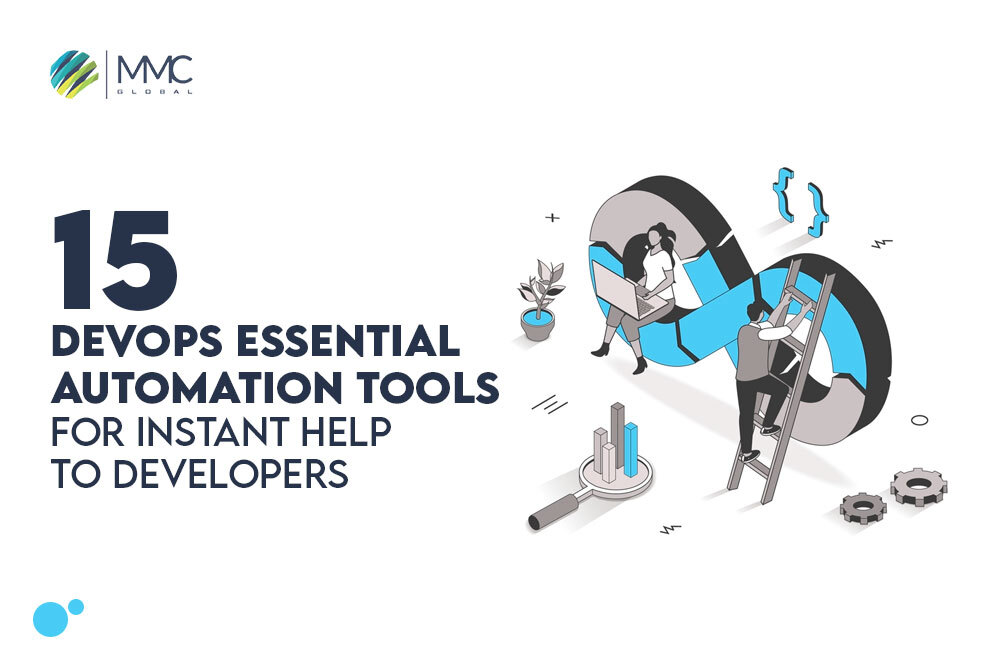15 Devops Essential Automation Tools for Instant Help to Developers


DevOps is a term that refers to the integration of development and operations to achieve continuous delivery of high-quality software. In DevOps, automation tools play a significant role, which allows developers to focus on the quality of the code, while automation takes care of the deployment, testing, and monitoring processes.
Automation tools help DevOps teams to streamline the software delivery pipeline, reduce errors, and achieve greater efficiency. At MMC Global, we use multiple DevOps automation tools to build high-performing solutions for our clients.

In fact, in this article, we will discuss the automation tools that we mostly use in DevOps.
15 Essential DevOps Automation Tools to Use
Jenkins
Jenkins is an open-source automation tool for continuous integration and delivery (CI/CD). It automates the building, testing, and deployment of software. Jenkins supports various plugins that can integrate with multiple tools and technologies. It enables developers to build and test their code automatically, and it also allows them to automate the deployment process.
Docker
It is a containerization tool that enables developers to create, deploy, and run container applications. Docker containers are lightweight and portable, which makes them ideal for DevOps environments. Moreover, it automates the deployment of applications and provides a consistent testing environment.
Ansible
Ansible is also an automation tool for configuration management, application deployment, and orchestration. It uses YAML to define automation workflows and enables developers to automate repetitive tasks. Furthermore, Ansible can automate the deployment of applications, configure servers, and manage infrastructure.
Kubernetes
Kubernetes is an open-source container orchestration tool for automating containerized applications’ deployment, scaling, and management. It also enables developers to manage their applications at scale and provides a consistent environment for testing and deployment. Moreover, Kubernetes also supports autoscaling, which can automatically adjust the number of containers based on demand.
GitHub
Git is a version control system and also use to manage source code. It allows developers to collaborate on code and track changes. In addition, Git provides a central repository for code and allows developers to branch and merge code easily. Git can automate the deployment of applications.
Nagios
Nagios is an open-source monitoring tool that monitors the health and performance of applications, systems, and network devices. It can automate the monitoring process and alert developers when issues arise. Nagios also supports plugins, which can monitor various systems and devices.
Puppet
Puppet is an automation tool for configuration management, application deployment, and orchestration. It also uses declarative language to define the infrastructure and enables developers to automate repetitive tasks. However, Puppets automate the deployment of applications, configure servers, and manage infrastructure.
Chef
Chef is an automation tool for configuration management, application deployment, and orchestration. Furthermore, it uses declarative language to define the infrastructure and enables developers to automate repetitive tasks. Chef automates the implementation of applications, configuring servers, and managing infrastructure.
Selenium
Selenium is an open-source testing tool to automate web browsers. It enables developers to test their applications across various browsers and operating systems. Moreover, Selenium supports multiple programming languages, which makes it flexible and easy to use.
Splunk
Splunk is a monitoring and analytics tool for monitoring applications, systems, and network devices. It provides real-time visibility into the health and performance of applications and enables developers to troubleshoot issues quickly. in fact, Splunk also supports plugins, which can be used to monitor various systems and devices.
Grafana
Grafana is an open-source monitoring tool used for visualizing and analyzing metrics. It supports many data sources, including Prometheus, Graphite, and Elasticsearch. Grafana enables developers to create dashboards and alerts to monitor the performance of applications and systems in real-time.
AWS CloudFormation
AWS CloudFormation is an infrastructure as a code tool used for deploying and managing infrastructure on Amazon Web Services (AWS).
In addition, it enables developers to create templates, which can be used to define and provision infrastructure resources. AWS CloudFormation automates the creation and deployment of infrastructure, which makes it easier to manage resources at scale.
CircleCI
CircleCI is a continuous integration and delivery (CI/CD) tool for building, testing, and deploying applications. Moreover, it enables developers to automate the software delivery pipeline and supports various programming languages and frameworks. In addition, CircleCI enables developers to test their code automatically, deploy it to multiple environments, and monitor the performance of applications.
Prometheus
Prometheus is another open-source monitoring tool used for collecting and storing metrics. It enables developers to monitor the performance of applications and systems in real time and provides a flexible query language for analyzing metrics. In fact, 9Prometheus supports a wide range of exporters, which can be used to monitor various methods and devices.
ELK Stack
ELK Stack is a collection of open-source log management and analysis tools. It includes Elasticsearch, Logstash, and Kibana, which can be used to collect, process, and visualize logs. ELK Stack enables developers to monitor the health and performance of applications and troubleshoot issues quickly.
Read More: DevOps Solutions: Role of DevOps in a Software Development Company
Conclusion
In conclusion, automation tools play a significant role in DevOps environments. They enable developers to automate repetitive tasks, streamline the software delivery pipeline, and achieve greater efficiency. In fact, the automation tools mentioned above are just a few examples of the many tools available in the DevOps ecosystem. DevOps teams should choose the tools that best fit their needs and integrate them into their software delivery pipeline. DevOps teams can deliver high-quality software quickly and reliably with the right automation tools.



